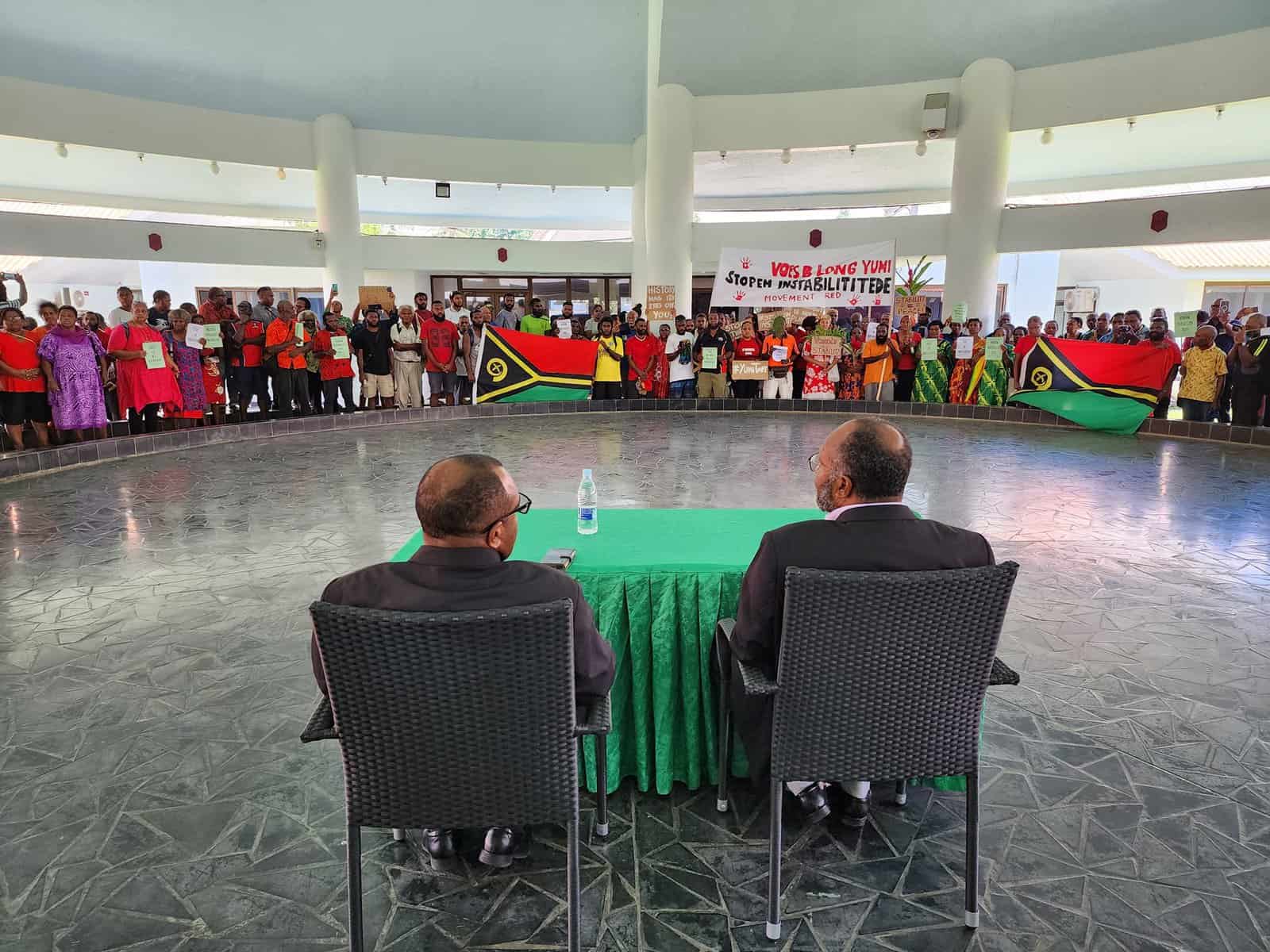An upcoming referendum in Vanuatu to outlaw political-party hopping by legislators has sparked lively debate in the Pacific island country, which has faced three changes of government in the past year.
Dissatisfaction with political instability and a fast-rising cost of living is widespread in the archipelago nation of more than 300,000 people. But there are also concerns that outlawing changes of political allegiance during a parliamentary term could be undemocratic.
The past year has been particularly tumultuous for Vanuatu’s politics with three motions of no-confidence against incumbent governments, resulting in a succession of prime ministers. There was also a snap election in October 2022. The prime minister at that time, Bob Loughman, dissolved his brief government in response to a no-confidence challenge, but it only resulted in reelection of the same crop of party-hopping legislators.
“I wholeheartedly support the yes vote to halt this practice, as it is a key factor causing instability and hindering development,” Port Vila businessman Lopez Adams told RFA-affiliated news organisation BenarNews.
The problem will become even bigger if left unaddressed, Adams said, because Vanuatu’s economy needs stability to grow fast enough to provide opportunities and jobs for an expanding youth population.
“Using someone to ascend a ladder and then shifting to another’s is unethical and lacks principles,” he said.
Vanuatu has been known for fractious politics and short-lived governments since independence from joint French and British rule in 1980. Like other Pacific island nations, it is increasingly the focus of China-U.S rivalry for influence in the region.
Vanuatu sends many of its young people to work on plantations in Australia and New Zealand because of lack of economic opportunities at home, and its government has earned notoriety abroad for boosting its coffers with a passports-for-sale scheme.
Among its challenges, tropical cyclones regularly batter Vanuatu and it also is prone to earthquakes and volcanic eruptions because it sits atop the seismically active Pacific “Ring of Fire.”
The referendum planned for 29 May proposes that the country’s constitution should be amended so that any lawmaker who leaves or changes political party during the parliamentary term loses their seat. It also proposes that parliamentarians with no political party affiliation be required to join a party within three months of being elected or lose their seat.
A majority of Vanuatu’s Parliament backed the overhaul by passing an anti-party hopping law last year. Constitutional changes to the electoral system require a national referendum to be enacted.
Andrew Solomon Napuat, a member of Parliament and first deputy speaker, said the changes would prevent lawmakers from switching parties purely out of self interest and would be a step toward addressing political instability by allowing governments to last a full four-year term.
“We have to ask ourselves – how can we control people who will not listen to voters and do not put the nation first as a priority,” Napuat said in an interview with BenarNews.
The proposed amendments to the constitution are being hotly debated on Facebook, where some posters have said they would be incompatible with democratic principles.
“Vanuatu has a democratic system of governance, but when the referendum focuses on removing the constitutional right of an individual member of Parliament, are we still in a democracy?” said a user named Anonymous Participant in the Facebook group Yumi Tok Tok Stret.
Napuat said much of the information spreading on social media does not accurately reflect the scope of the amendments, which only apply to the actions of members of Parliament and not the public at large.
He also said the referendum has its limitations in tackling government corruption, but the pivotal role in that area should be played by police, the courts and the Office of the Ombudsman, which investigates complaints about government agencies.
Vanuatu’s Prime Minister Charlot Salwai earlier this month urged the public to participate in the referendum and said there was a great need to shape the future of the country’s democracy.
Minister of Internal Affairs Johnny Koanapo Rasou has promised comprehensive outreach about the referendum to every Vanuatu citizen, including those abroad in places such as New Caledonia, Australia and New Zealand, so all voters have appropriate information.
Albert Iauma, one of the thousands of Vanuatu men and women employed as seasonal workers in Australia, said he would vote “yes” in the referendum if given the chance.
Vanuatu’s politicians should be focusing on more important issues than party hopping, including the challenges faced by seasonal workers, he said. “Leaders need to prioritise substantial problems over investing time and money in dealing with political instability. I look forward to casting my vote,” Iauma said.
